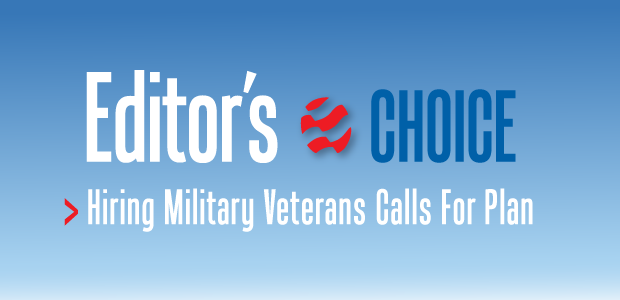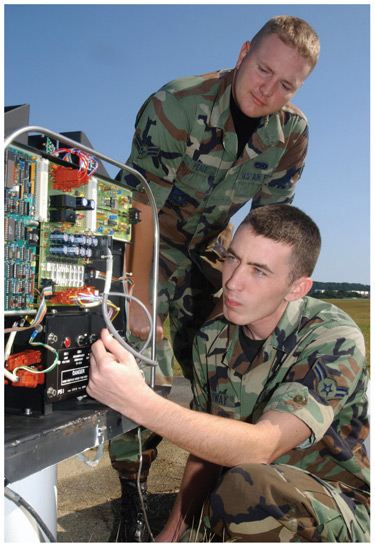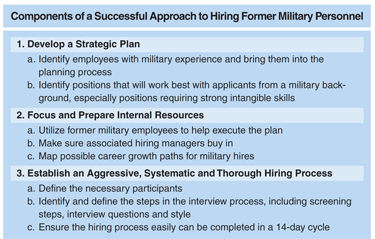
Hiring Military Veterans Calls For Plan
By David Lehmkuhl and Michael K. Harvey
AUSTIN, TX.–As a proven business multiplier, military veteran hiring has garnered media notice ever since it was brought to corporate America’s attention in the mid-1990s by General Electric, and it has continued to attract attention, for instance, as the cover story of the March 2010 issue of Fortune.
Numerous companies throughout corporate America effectively have utilized this incredible source of talent, but the reality is that others have failed miserably. The question is why.
After studying the companies that have had the most success hiring military talent and the practices to which those companies adhere, three consistent themes emerge:
- They develop strategic plans at the corporate or business unit level.
- They focus and prepare their internal resources.
- They design, implement and execute aggressive, systematic and thorough hiring processes that allow them to achieve that success. Great leaders in the military and business agree that failing to plan for success means never achieving it.
Developing A Strategic Plan
Every company initiates its yearly strategic planning process well in advance of the upcoming year to identify areas for growth and the associated operational plans to achieve these goals. This type of planning also is required for a successful military veteran hiring program. Companies that effectively hire military veterans develop very detailed and calculated plans before ever asking the first interview question. Such planning allows a company to identify strategic areas and positions that present opportunities for job candidates with military experience. The process also allows the company to identify former military personnel already in the organization to help plan and execute the program.
Oil and gas companies have enjoyed great success hiring former military officers for positions in project management, engineering, supply chain management and maintenance. The value a former military technician may bring to an organization receives comparably less attention, but that has not stopped some companies from figuring out how to effectively harness that talent.
The technical expertise, motivation and analytical skills often honed in military service apply well in the oil and gas industry. Although retired military officers are known for the strengths they bring to civilian sector jobs, former military technicians provide another, less renowned, source of talent.
Seth Robert of Canrig Drilling Technology Ltd., himself a veteran, indicates that the company has placed numerous military veterans into field service positions throughout the company. “Many of the (military) candidates have moved up within the past couple of years and now are considered some of the leaders within our company,” he reports. “They are motivated, experienced, and have the work ethic we look for.”
These technical positions are often ideal for former military personnel because they typically require people who can lead teams effectively, multi-task, focus on safety, increase revenue, and achieve organizational goals. David Brunnert, vice president of intervention services at Weatherford International Ltd. remarks, “A common mantra you will hear in the military is ‘Mission first, people always.’”
The military obsession with completing the mission is directly transferable to business. Although many people seem to think their jobs are about trying hard to meet objectives, employees hired from the military do not confuse trying hard with completing the mission.
Several players in the oil and gas industry have seen the value of seeking former military personnel for leadership roles. BP, Occidental Petroleum Corp., ConocoPhillips Co., and Parker Drilling are some of the biggest players to identify former military candidates as people with the potential to help lead their companies.
Successful companies develop strategic hiring plans designed to hire a specific percentage of military veterans for certain identified positions to support their business objectives. These hiring plans may include structured leadership development programs, training programs or informal on-the-job training. While numerous companies develop good military hiring plans, they often falter in executing the next two steps.
Setting The Stage
Once the strategic hiring plan for military candidates is complete and the company is committed to its success, the company must make sure it is poised to achieve it. To set the operational stage, companies should:
- Identify and utilize employees with military experience;
- Persuade the associated hiring managers’ of the plan’s value so they will buy in; and
- Plan effective ways in which veterans’ careers can grow and advance.
Most companies employ former military members who may not have been hired through dedicated military hiring strategies, but they are some of the companies’ most valuable–and often the most underutilized–assets in developing and executing that hiring strategy.
Employees with military experience can help explain and translate a company’s activities and they often know how veterans may apply their tangible and intangible assets to the organization. Companies should utilize these former military personnel as consultants because they have the experience and knowledge to help set the stage for recruiting and hiring others who have been in the armed services.
Another element successful military hiring programs require–above all others–is commitment from the appropriate hiring managers. They must buy in. Hiring managers have the experience and first-hand knowledge of the associated positions and departments to understand how a military veteran’s specific experiences and qualities may apply. A recent survey revealed that the hiring manager attended applicants’ initial interviews in 27 of 30 companies that sought to hire applicants with military experience.
Advancement Opportunities
Top-tier military personnel will excel and grow at a company if given the opportunity. Military veterans, by nature, tend to be ambitious, driven and interested in growing into positions of increasing responsibility. Furthermore, companies should recognize that military experience helps these employees learn swiftly. Employers can expect veterans to quickly grasp the oil and gas industry and the assigned roles of their positions, and to distinguish themselves soon.
“In jobs that center solely on managing people and projects, most of the relevant knowledge is 90 days old or less,” Brunnert reports. “Thus, in these areas, former military personnel can make an impact in short order.”
JP Mook, competency manager for North and South America with National Oilwell Varco, says he could not agree more. “Military service members should not underestimate the value of the skills and experience they bring to the table,” he emphasizes. “In today’s oil and gas industry, (applicants with) a demonstrable skill to lead, combined with the intense training on both ‘soft’ and technical skill sets, are extremely valuable.”
Mook enjoyed a successful Air Force career at the Pentagon, where his work focused on long-range manpower and structure planning. In the years since, he has enjoyed a sterling career in the oil and gas industry, where he began as a field service technician and quickly rose through the ranks to his current position.
When he attempts to pinpoint the skill he thinks has most contributed to his success, Mook admits difficulty with choosing only one. Even so, he says he settles on “the soft skills definitely–listening to others, customer service, a focus on mission accomplishment. Former military candidates are going to possess these soft skills, as well as an ability to be process oriented and thorough in their approach.”
Former military personnel tend to be loyal and enjoy being part of a team. Usually, they also want a clear understanding of their potential career progression if they achieve success in an organization. Although different people should not expect identical career paths, it is critical that companies clearly articulate to former military employees what opportunities await as they grow in their organization. This focus on career planning and progression will allow a company to retain top military talent as those employees develop into an organization’s future leaders.
In 2001, Tom Redlinger was an Army captain stationed at Fort Hood, Tx. After serving four years and leading soldiers during numerous deployments into Bosnia as a combat engineer, Redlinger decided to apply to the civilian sector the skills he had learned in the Army. He accepted a position with Weatherford in March 2001 as a design engineer. It was not his mechanical engineering degree that accelerated his career at Weatherford nearly as much as his project management, leadership and decision making skills, which Redlinger says he learned and perfected during his time in the service.
He quickly distinguished himself among his peers and was promoted to senior design engineer after a few months. By Redlinger’s third year on the job in 2004, Weatherford had promoted him to engineering supervisor, a position usually reserved for staff members with 10 years of experience. Redlinger attributes his quick success and promotion to his “ability to backward plan, understand the critical path for a project and deliver results.”
Redlinger eventually was promoted to product line manager, where he manages several product lines in Weatherford’s drilling tool business. As he attempts to summarize his time in the service and its relationship to his career at Weatherford, Redlinger suggests it is a matter of completing each mission. “It is about getting multiple people to agree on a common path and execute goals,” he describes. “In today’s world of business, a lot of the leadership and project management issues I faced in the military have been directly relevant in my career and have allowed me to achieve success.”
The Hiring Process
Once the strategic and operational groundwork is set, it is time to execute a hiring plan that features a trio of characteristics common to military candidates. It must be:
- Aggressive, actively recruiting and searching for the best talent;
- Systematic, with a defined series of steps and specific timeline; and
- Thorough, relying on an interview process that selects the right candidate.
Decades of experience matching military veterans with civilian sector jobs points to consistent success for companies that complete the entire interview process–from first interview to a job offer–in two weeks. Despite those time parameters, the process also must be very thorough because, although the military often generates elite talent for the job market, not every service member exiting the military constitutes a perfect fit for every category of business.
A thorough screening is necessary to ensure selection of the best talent for the organization. Companies that rely on recruiting at military job fairs tend to miss top-tier talent because most junior military officers and technicians already have turned to private military recruiting firms and have been interviewing for positions well before their anticipated transition dates.
Companies’ interview teams must, at minimum, include the human resources manager, any hiring managers and, ideally, an employee with military experience to help recognize top performers and the relevance of the applicant’s experience.
In summary, Table 1 reviews the elements companies require to help ensure successful hiring programs. Although most companies that take these steps toward dedicated and ongoing military hiring plans will not see their plans featured in Fortune, they very well may be featured for their business growth.

DAVID LEHMKUHL is an account executive with Orion International, a military recruiting firm specializing in junior military officers and technicians, and has worked with numerous clients in the oil and gas industry. A graduate of Virginia Military Institute and a former Army artillery officer, he served nine years before transitioning to the civilian sector.

MIKE K. HARVEY is a partner with Orion International and the company’s resident subject matter expert in placing former military men and women into the oil and gas sector. A graduate of Southern Illinois University, he is a former Army signal/air defense artillery officer who served 11 years before transitioning to Orion International from Fort Bliss, Tx.
For other great articles about exploration, drilling, completions and production, subscribe to The American Oil & Gas Reporter and bookmark www.aogr.com.



















